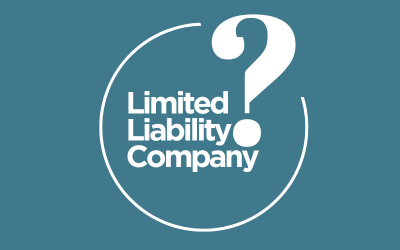Every year, millions of Americans start businesses. And every year, most of them make the same mistake: they operate as Sole Proprietors by default, never realizing what they’re risking or missing out on.
The decision between operating as a Sole Proprietorship versus forming an LLC is one of the most important choices you’ll make as a business owner. Yet it’s also one of the most misunderstood.
Five myths first-time entrepreneurs believe:
- I don’t need an LLC until I’m making real money. The reality is liability risk exists from day one, regardless of revenue. A single lawsuit could wipe you out before you ever turn a profit. Protection costs a few hundred dollars; a judgment could cost everything.
- LLCs are expensive and complicated. The reality is state filing fees range from $50-$500. With an online service like CorpNet, the entire process takes about 10 minutes. Annual compliance is minimal and usually just a simple report and maintaining a registered agent.
- I’ll pay more in taxes with an LLC. The reality is by default, a single-member LLC is taxed exactly like a Sole Proprietorship. But an LLC gives you options: you can elect S Corporation taxation to potentially save on self-employment taxes once your income reaches a certain level.
- I can always form an LLC later if I need to. The reality is protection doesn’t work retroactively. An LLC formed after a lawsuit is filed won’t protect you from that lawsuit. The liability exposure you’re taking today is real and very permanent.
- My business is too small for anyone to sue. The reality is small businesses get sued all the time. Contract disputes, slip-and-fall accidents, dissatisfied customers, intellectual property claims—these happen at every business size. In fact, small businesses without legal representation are often seen as easier targets.
In this guide, we’ll cut through the confusion, debunk the myths, and give you a clear framework for deciding which structure is right for your business.
Highlights of the Two Business Structures
When an individual (or married couple) starts a business, it is, by default, considered a Sole Proprietorship. Operating as a Sole Proprietorship requires no business formation paperwork with the state. In a Sole Proprietorship, the owner and the business are considered the same legal and tax-paying entity.
The Limited Liability Company (LLC) is a business entity type formed under state laws. It is a state construct requiring formal registration. The single-member LLC is the entity most comparable to a Sole Proprietorship. It has one owner, which is known as a “member”. LLCs with more than one owner are multi-member LLCs. Multi-member LLCs may choose to be managed by their members or by a manager (or managers) designated by the LLC’s members. An LLC is considered a separate legal entity from its owner. By default, an LLC and its owners are considered the same tax-paying entity.
Here’s an at-a-glance run-down of some highlights to compare a sole proprietorship vs. LLC business structure:
- Sole proprietorships are generally less expensive to establish and easier to maintain administratively.
- In a Sole Proprietorship, owners are taxed at the applicable individual income tax rates on profits that the business makes.
- LLCs shield their owners legally, providing a level of personal liability protection against the debts of the business.
- LLCs must complete formation documents, register with the state, and pay a filing fee.
- LLCs must follow their state’s laws that govern the LLC entity type. They may need to pay annual fees, file annual reports, and hold annual meetings.
- LLCs must keep their company records and funds separated from those of their owners.
- LLCs have tax flexibility—they may choose to be taxed as a Sole Proprietorship (or partnership if multiple owners), C Corporation, or S Corporation.
As you can see, there are potential pros and cons to each business structure. Which will be the best option for you will depend on your specific circumstances and objectives.
Comparison Summary of LLCs and Sole Proprietorships
| Sole Proprietorship | Limited Liability Company (LLC) | |
|---|---|---|
| Personal Liability Protection | None | Yes |
| Business Credibility | Minimal | High |
| Growth Potential | Minimal | Supports Members and Funding |
| Business Bank Account | Difficult to Open | Easy to Open |
| Business Credit | Tied to Personal Credit | Can Establish as Business |
| Formation Requirements | No Paperwork Required | Formal Registration With State |
| Business Name Registration | DBA Required | Business Name Registered at Formation |
| Federal Income Tax Treatment | Passed to Personal Income via IRS Schedule C | Passed to Personal Income via IRS Schedule C Unless S Corporation is Elected |
| Registered Agent Requirement | None | Yes |
| Ongoing Compliance Requirements | Minimal | Annual Report |
Getting to Know the Sole Proprietorship
There are good reasons why Sole Proprietorships, which are businesses owned and operated by one person or a married couple, are the most popular business structure in the United States.
They’re easy and inexpensive to get up and running because they don’t require owners to file any paperwork or pay fees to the state, and owners have full control over their businesses.
Key takeaways concerning Sole Proprietorships include the following:
- If you start a business without filing registration paperwork with the state, the state automatically considers your business to be a Sole Proprietorship, or, if you open the business with someone else, a General Partnership.
- Sole Proprietorships are subject to pass-through taxation, meaning that all income and losses flow through to the personal tax returns of owners.
- You might be required to obtain business licenses or permits, depending on what services you provide, but you don’t need any approval from the state to start the business and begin working.
- Business licenses can be issued by your local, state, or federal government. What you need will vary, depending on your type of business and where you live. It’s not unlikely that you’ll need a local business operating license, which is issued by your local or city government and gives you the right to run your business. Other businesses, such as plumbing or barber shops, may need a business license that’s specific to the occupation.
- You’ll also need to deal with some paperwork if you plan to operate the business under a name that’s different from your legal name. In that case, you’ll have to let the state know by filing a “Doing Business As,” or DBA. If you want to protect your DBA or a logo or other design associated with your business, you may also need to file a trademark application with the U.S. Patent and Trademark Office.
- A business run as a Sole Proprietorship is not considered to be a separate entity from its owner. The owner, essentially, is the business and there’s no legal separation between the two.
Getting to Know the LLC
Unlike a Sole Proprietorship, an LLC is considered a separate legal entity from its owner or owners. That status provides personal liability protection and shields the personal assets of owners if the business is sued or can’t pay its debts.
Key takeaways concerning LLCs includes the following:
- LLC owners, who are known as members, must register the business with the state by filing Articles of Organization, a public document that contains basic information about the company.
- It varies from state, but that information in the Articles of Organization usually includes the name and address of the LLC; its purpose; management structure; how long the business plans to operate; and the name of the company’s Registered Agent, which is a person or company designated to receive legal correspondence on behalf of the business.
- An LLC formed in the state in which it will operate is known as a Domestic LLC, while one formed in a state other than where it will conduct business is a Foreign LLC. It makes sense in most cases to register as a Domestic LLC, although some entrepreneurs choose a state that might be more business friendly regarding taxation, privacy protections, and compliance requirements.
- An LLC with one owner is called a Single-Member LLC, while those with two or more owners is a Multiple-Member LLC. All LLCs, even those with just one member, should have an Operating Agreement, which is a document stating the terms of how the LLC will operate, based on the needs and wishes of its members.
- Although it’s not required by law in most states, an Operating Agreement is extremely important for an LLC. Not only does it provide a roadmap for how the business will operate, it also demonstrates that the LLC is a separate entity from its owners. That reinforces the limited liability status of the business, which can be a huge advantage in the event of a lawsuit. You can download a template for an Operating Agreement or look for professional help if you’re uncertain of how to proceed.
- An LLC can be member-managed, meaning it’s run by all the owners, or manager-managed, in which case a designated manager takes charge of operations. Managers and their duties are stated in the Operating Agreement, which is signed by all members.
- Your LLC won’t be allowed to use the same name as that of another business registered within the state, so you’ll need to check through the Secretary of State’s office to make sure the name you want to use is available. There are some regulations pertaining to LLC names, including that you include the LLC designation when registering your business. If your business is registered as Carolyn Jones’ Custom Wedding Cakes, LLC and you want to operate simply as Carolyn’s Custom Cakes, you’ll need to file for a DBA.
- An LLC is by default taxed as a Sole Proprietorship or General Partnership, although owners can opt to have the business taxed as a Corporation. Some entrepreneurs choose that option to reduce the amount of Social Security and Medicare taxes – also known as self-employment taxes – they’re required to pay, or to avoid having profits and losses of the LLC affect their personal tax returns.
Advantages and Disadvantages of Sole Proprietorships
Let’s dig a little deeper into Sole Proprietorships by identifying some of the pros and cons of this type of business entity.
Advantages of a Sole Proprietorship:
- Getting started is easy, as there’s no need to register the business with the state.
- There’s no need to file annual reports or pay annual fees.
- The pass-through method of taxation that applies to Sole Proprietorships is simpler and more streamlined than with some other business entities
- You’re not required to have a Registered Agent.
- A business bank account is not required, although it’s highly recommended to keep personal and business funds separated.
- The owner has complete control of how the business operates.
While Sole Proprietorships are attractive to many entrepreneurs, there are some significant disadvantages to consider. Arguably, the most important is personal liability, a result of the lack of legal distinction between the business and its owner.
Disadvantages of a Sole Proprietorship:
- Unlimited personal liability. If a Sole Proprietorship is sued or incurs debt it can’t repay, the owner generally is responsible. If business funds aren’t sufficient to settle a lawsuit or repay the debt, your personal assets, including bank accounts, your home, and vehicles, could be in jeopardy.
- Net income from the business increases your personal income and could put you into a higher tax bracket, meaning your tax burden would increase.
- Sole Proprietors are self-employed and must pay both the employer and employee shares of Social Security and Medicare taxes. In 2025, those taxes totaled 15.3% of earnings.
- A Sole Proprietor may find it difficult to raise capital for their business, as many lenders are reluctant to fund a company that may not be generating regular, reliable income or have significant savings. If you secure a personal loan to cover business expenses, you’ll need to use personal assets as collateral, putting them at risk if you’re unable to repay the loan.
- Because a Sole Proprietorship can’t expand without changing to another business structure, such as a Partnership, LLC, or Corporation, growth opportunity is limited.
- It can be difficult for a small business to attract employees if the owner is unable to offer competitive.
- Because a Sole Proprietorship is not a separate legal entity from its owner, only the assets of the business can be sold – not the business itself. A buyer can purchase tangible and intangible assets, including real estate, inventory, equipment, the business name, contracts, and client lists – but not the business itself.
- In most cases, a Sole Proprietorship cannot continue after the death of the owner. The business is likely to cease to exist when the owner dies.
- Running your own business as a Sole Proprietor can be uncertain, as there’s no guarantee of a regular paycheck, employee benefit package, retirement savings plans, or other perks associated with working for an employer.
Advantages and Disadvantage of LLCs
As you’ve already read, creating an LLC requires registering your business with the state. While that makes getting started more complicated, there are distinct advantages to the LLC business structure.
Advantages of an LLC:
- Owners have protection from personal liability if they’re sued or can’t meet a financial obligation, such as repaying a loan or paying a large bill from a supplier. That, obviously, is a huge benefit of this type of business structure, as it can protect the personal assets of owners.
- The ability to choose to be taxed as a Corporation can, in some cases, result in tax savings for LLC members.
- Owners can choose whether an LLC will be member-managed or manager-managed.
- There is no limit to the number of members an LLC can have, a benefit that increases growth capacity.
- LLC members may organize the business in a way that makes sense for them, detailing their plans in the company’s Operating Agreement.
- There is no limit to the number of members an LLC can have, a benefit that increases growth capacity.
Disadvantages of an LLC:
- Getting an LLC started requires you to register the business with the state.
- Unlike a Sole Proprietorship, there are fees involved with registering an LLC.
- LLC owners must be careful to maintain compliance by filing annual reports, paying annual fees, maintaining a Registered Agent, and adhering to state laws.
- Start-up and ongoing fees required for an LLC can be a disadvantage for some entrepreneurs.
- It can be challenging to transfer membership from one party to another. If not otherwise called for in an LLC’s Operating Agreement, some states require the business to be dissolved when there is a change in ownership. That means if one member leaves the company, it would have to shut down and then reform.
- Some entrepreneurs find that keeping necessary records, especially those regarding banking and finances, is a daunting task.
Business Requirements That Apply to Both
While there are some significant differences between LLCs and Sole Proprietorships, both must adhere to some of the same requirements, including the following:
- Pay income taxes (federal, state, local income tax; sales tax (if applicable); and payroll taxes if the business hires employees.
- Obtain an Employee Identification Number from the IRS. Usually required for opening a business bank account and always necessary if hiring employees, this federal tax ID number is used when filing taxes and submitting other business documentation to the federal government. Fortunately, EINs are free of charge.
- Comply with the local area’s zoning requirements.
- Request W-9s from independent contractors and send them 1099 forms at tax time. I recommend reading up on the importance of classifying workers as independent contractors or employees correctly.
- Obtain and renew applicable business licenses and permits.
These obligations come with the territory of owning a business and should never be ignored. As I mentioned earlier, entrepreneurs should seek professional legal and accounting insight to make sure they cover all the bases.
Prepare to Launch
When deciding whether to start your business as a Sole Proprietorship or an LLC, it’s important to consider your circumstances, including how much capital you have available, your plans for growth, how long you expect to operate the business, personal preferences for working alone or as part of a team, how much paperwork you’re willing to do, and other factors.
A Sole Proprietorship may be acceptable in very limited circumstances:
- You’re testing a business idea for a short period before committing
- Your activity is a genuine hobby with minimal income and zero liability risk
- You’re doing occasional, low-risk freelance work (though even this carries risk)
Even in these situations, the cost of an LLC is so low that the protection is almost always worth it.
When you should dDefinitely choose an LLC:
- You’re earning regular income from your business
- Your work involves any physical, professional, or product liability
- You’re signing contracts with clients or vendors
- You want to open a business bank account
- You plan to hire contractors or employees
- You have personal assets worth protecting
- You want to build business credit separate from personal credit
- You want to appear professional to clients and partners
Remember that as you’re ready to move forward, CorpNet is here to handle all of your business formation and compliance filings—in all 50 states! If you’ve decided to move forward with operating as a Sole Proprietorship and need to file a DBA and apply for the business licenses and permits, we can help. Or, if you want to register your company as an LLC and need to obtain your EIN and designate a registered agent, we can assist you with those tasks and more.
Our filing experts will take the pressure off of you and save you time and money. They will make sure all of your documentation is submitted accurately, on-time, and cost-effectively.
Form Your LLC Today!
Don’t leave your home, savings, and future at risk. CorpNet makes LLC formation fast, affordable, and backed by our 100% satisfaction guarantee. If you’re not completely satisfied, we’ll refund our service fee.





